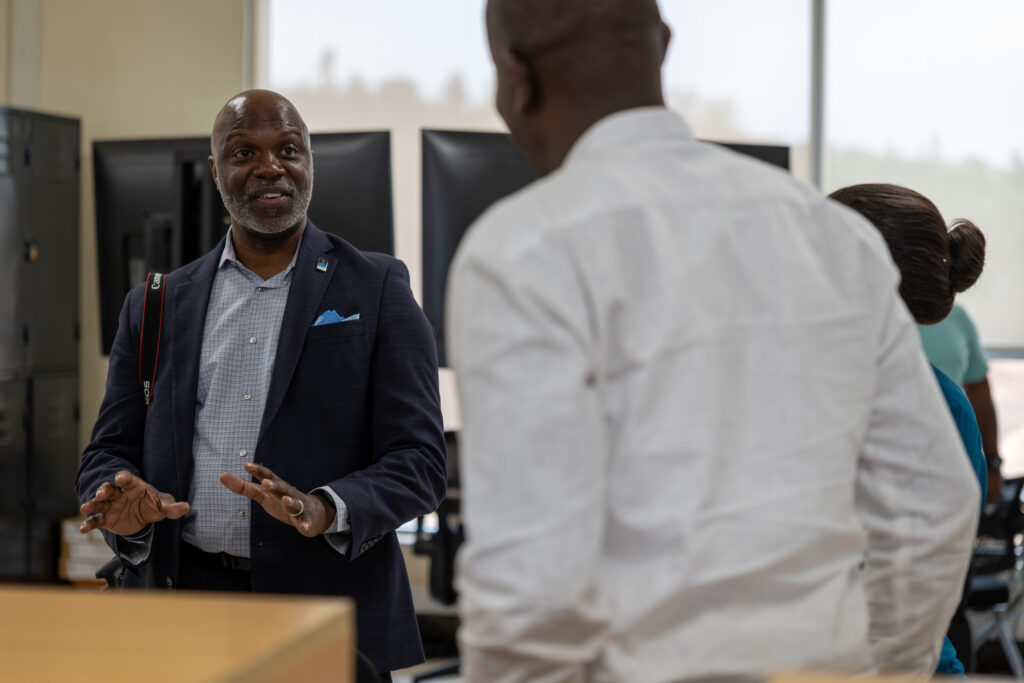Press Releases | 12.11.2024
Challenger Center Partners with Carnegie Mellon University Africa to Deliver STEM Programs

Washington, D.C. (December 11, 2024) – Challenger Center is proud to announce a partnership with Carnegie Mellon University Africa (CMU-Africa), CMU’s College of Engineering location in Kigali, Rwanda, to deliver its Virtual Missions to hundreds of secondary school students on the continent. This project will help grow the population of African students who are motivated to pursue higher education and careers in science, technology, engineering, and math (STEM) fields.
Challenger Center’s Virtual Missions are space-themed experiences for students aged 10-18. Current offerings include Destination Mars, Destination Moon, and Observation Earth. All three Virtual Missions expose students to a broad range of STEM concepts in the context of how they are applied in amazing, world-changing work like space exploration, medicine, and environmental conservation.
“Challenger Center is known for its highly engaging, very effective programs that inspire K-12 students to pursue STEM studies and careers in the United States. Our Virtual Missions have enabled us to efficiently expand our reach and impact globally,” said Valerie Fitton-Kane, vice president of development and partnerships at Challenger Center.
The Missions are designed to increase student STEM engagement, identity, self-efficacy, and career awareness, as well as to enable students to practice skills like communication, teamwork, and problem-solving. By building these skills and opening students’ eyes to exciting opportunities in the workforce, these Missions motivate students to pursue STEM studies and careers.

Challenger Center and CMU-Africa, in collaboration with local partners, will begin by focusing on engaging students in Rwanda. They plan to expand the reach of the Virtual Missions across the continent. They will place a strong emphasis on inclusion and gender equity to ensure participation from a diverse group of students. The program will also include outreach to high schools in refugee camps and other underserved or underrepresented areas.
“We look forward to collaborating with Challenger Center to engage young Africans through the exciting world of space,” said Conrad Tucker, director of CMU-Africa and associate dean for international affairs-Africa in CMU’s College of Engineering. “Through this project, we hope to get secondary school students excited about the field of STEM and educate them on how they can use these skills to make an impact in their communities and across the continent.”
Challenger Center has a history of collaboration with Carnegie Mellon University’s College of Engineering. In 2022, Challenger Center, RAND Corporation, and Carnegie Mellon University studied five learner populations—adults, K-12 teachers, K-12 principals, middle school students, and college students—and their ability to distinguish between real and deepfake videos about climate change. Their research, “Deepfakes and scientific knowledge dissemination,” was published in Scientific Reports.
About Challenger Center
As a leader in science, technology, engineering, and math (STEM) education, each year Challenger Center provides hundreds of thousands of students with experiential education programs that engage students in hands-on learning opportunities. These programs, delivered in Challenger Learning Centers and classrooms, strengthen knowledge in STEM subjects and inspire students to pursue careers in these important fields. Challenger Center was created by the Challenger families to honor the crew of shuttle flight STS-51-L. For more information about Challenger Center, please visit www.challenger.org or connect on Facebook, Twitter, and LinkedIn.
About the College of Engineering and CMU-Africa
The College of Engineering at Carnegie Mellon University is a top-ranked engineering college that is known for its Advanced Collaboration culture in research and education. CMU-Africa was established in 2011 through a partnership between Carnegie Mellon and the Government of Rwanda. CMU-Africa is the only U.S. research university offering its master’s degrees with a full-time faculty, staff, and operations in Africa. The institution is addressing the critical shortage of high-quality engineering talent required to accelerate the economic transformation of the African continent. For more information on the Engineering program in Africa, please visit: africa.engineering.cmu.edu or connect on Twitter at @CMUEngineering and @CMU_Africa.
